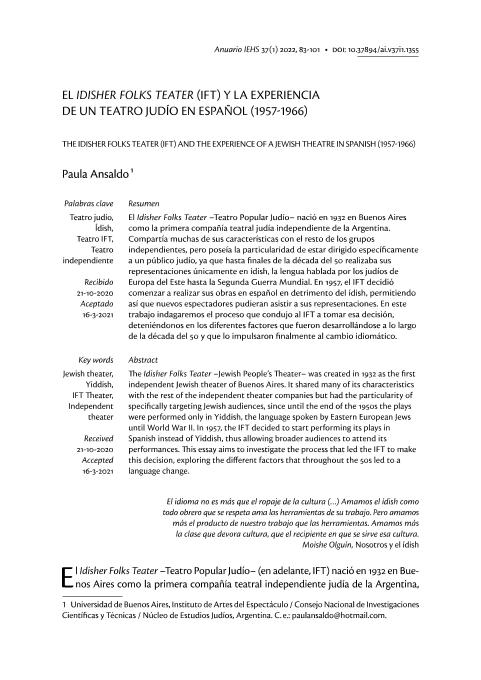Mostrar el registro sencillo del ítem
dc.contributor.author
Ansaldo, Paula Nora

dc.date.available
2023-06-28T14:32:11Z
dc.date.issued
2022-06
dc.identifier.citation
Ansaldo, Paula Nora; El Idisher Folks Teater (IFT) y la experiencia de un teatro judío en español (1957-1966); Universidad Nacional del Centro de la Provincia de Buenos Aires. Facultad de Ciencias Humanas. Instituto de Estudios Histórico-Sociales "Prof. Juan Carlos Grosso"; Anuario IEHS; 37; 1; 6-2022; 83-101
dc.identifier.issn
0326-9671
dc.identifier.uri
http://hdl.handle.net/11336/201647
dc.description.abstract
El Idisher Folks Teater –Teatro Popular Judío– nació en 1932 en Buenos Aires como la primera compañía teatral judía independiente de la Argentina. Compartía muchas de sus características con el resto de los grupos independientes, pero poseía la particularidad de estar dirigido específicamente a un público judío, ya que hasta finales de la década del 50 realizaba sus representaciones únicamente en ídish, la lengua hablada por los judíos de Europa del Este hasta la Segunda Guerra Mundial. En 1957, el IFT decidió comenzar a realizar sus obras en español en detrimento del ídish, permitiendo así que nuevos espectadores pudieran asistir a sus representaciones. En este trabajo indagaremos el proceso que condujo al IFT a tomar esa decisión, deteniéndonos en los diferentes factores que fueron desarrollándose a lo largo de la década del 50 y que lo impulsaron finalmente al cambio idiomático.
dc.description.abstract
The Idisher Folks Teater –Jewish People’s Theater– was created in 1932 as the first independent Jewish theater of Buenos Aires. It shared many of its characteristics with the rest of the independent theater companies but had the particularity of specifically targeting Jewish audiences, since until the end of the 1950s the plays were performed only in Yiddish, the language spoken by Eastern European Jews until World War II. In 1957, the IFT decided to start performing its plays in Spanish instead of Yiddish, thus allowing broader audiences to attend its performances. This essay aims to investigate the process that led the IFT to make this decision, exploring the different factors that throughout the 50s led to a language change.
dc.format
application/pdf
dc.language.iso
spa
dc.publisher
Universidad Nacional del Centro de la Provincia de Buenos Aires. Facultad de Ciencias Humanas. Instituto de Estudios Histórico-Sociales "Prof. Juan Carlos Grosso"

dc.rights
info:eu-repo/semantics/openAccess
dc.rights.uri
https://creativecommons.org/licenses/by-nc/2.5/ar/
dc.subject
TEATRO JUDÍO
dc.subject
TEATRO INDEPENDIENTE
dc.subject
TEATRO IFT
dc.subject
CAMBIO LINGÜÍSTICO
dc.subject.classification
Artes escénicas

dc.subject.classification
Arte

dc.subject.classification
HUMANIDADES

dc.title
El Idisher Folks Teater (IFT) y la experiencia de un teatro judío en español (1957-1966)
dc.title
The Idisher Folks Teater (ift) and the experience of a jewish theatre in spanish (1957-1966)
dc.type
info:eu-repo/semantics/article
dc.type
info:ar-repo/semantics/artículo
dc.type
info:eu-repo/semantics/publishedVersion
dc.date.updated
2023-06-26T16:13:16Z
dc.journal.volume
37
dc.journal.number
1
dc.journal.pagination
83-101
dc.journal.pais
Argentina

dc.journal.ciudad
Tandil
dc.description.fil
Fil: Ansaldo, Paula Nora. Consejo Nacional de Investigaciones Científicas y Técnicas; Argentina. Universidad de Buenos Aires. Facultad de Filosofía y Letras. Instituto de Artes del Espectáculo "Dr. Raúl H. Castagnino"; Argentina
dc.journal.title
Anuario IEHS

dc.relation.alternativeid
info:eu-repo/semantics/altIdentifier/url/https://ojs2.fch.unicen.edu.ar/ojs-3.1.0/index.php/anuario-ies/article/view/1355
dc.relation.alternativeid
info:eu-repo/semantics/altIdentifier/doi/https://doi.org/10.37894/ai.v37i1.1355
Archivos asociados
